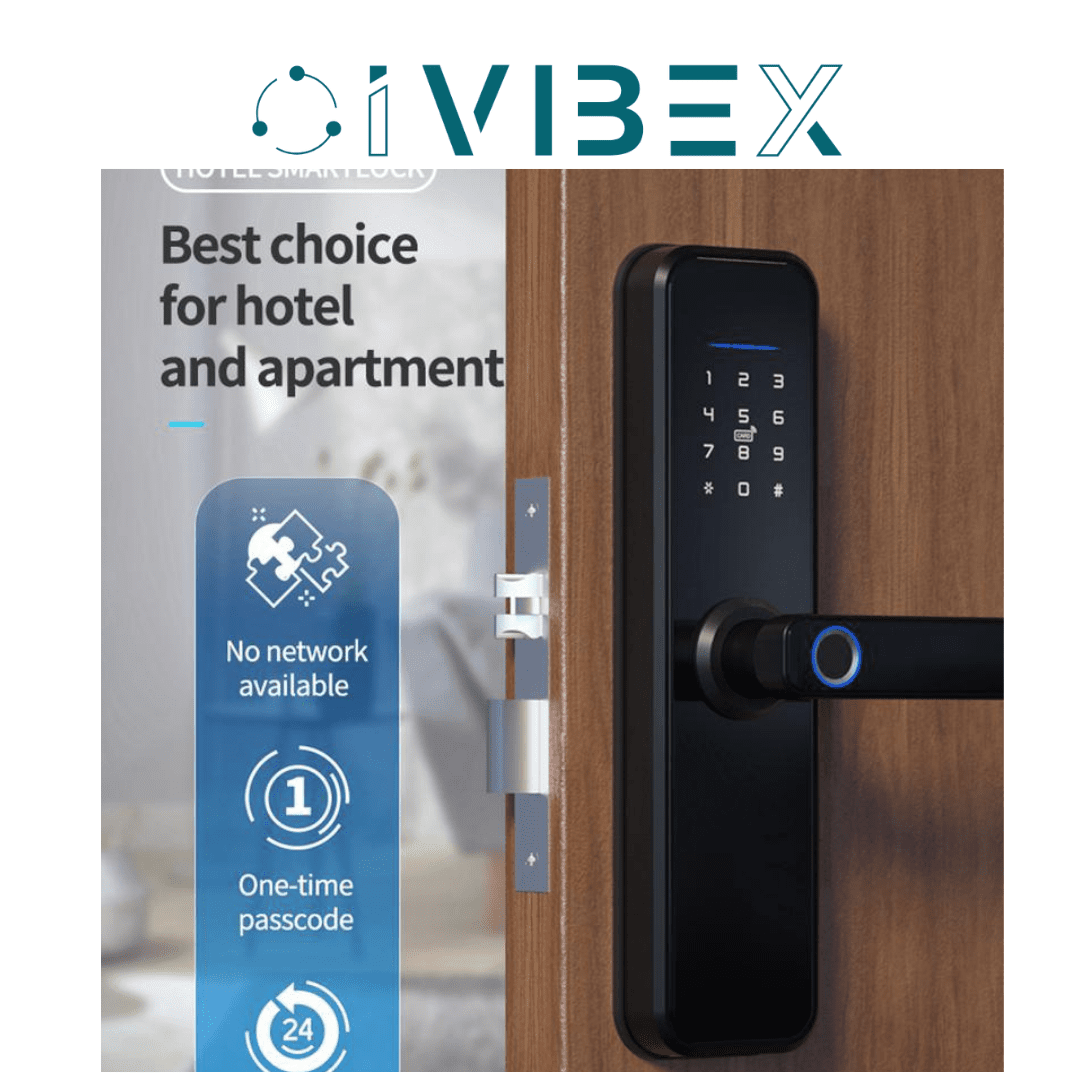Smart door locks revolutionize the way we secure our interior spaces, offering a blend of convenience and cutting-edge technology. From keyless entry to seamless integration with smart home systems, these innovative devices are changing the game when it comes to safeguarding our homes.
Explore the world of smart door locks and discover a new era of interior security.
Introduction to Smart Door Locks

Smart door locks are innovative security devices that offer advanced features to secure interior spaces. These locks can be controlled remotely through a smartphone or other smart devices, providing convenience and peace of mind to users.
Using smart door locks is crucial for enhancing the security of interior spaces, as they offer keyless entry options, real-time monitoring capabilities, and the ability to grant access to specific individuals at designated times. This ensures that only authorized individuals can enter the space, reducing the risk of unauthorized access.
Examples of Different Types of Smart Door Locks
- Keyless Entry Keypad Locks: These locks require users to enter a code on a keypad to unlock the door, eliminating the need for physical keys.
- Biometric Door Locks: These locks use fingerprint recognition or facial recognition technology to grant access to authorized individuals based on their unique biometric data.
- Bluetooth-Enabled Smart Locks: These locks can be controlled via Bluetooth connectivity, allowing users to lock or unlock the door using their smartphones.
- Remote-Controlled Smart Locks: These locks can be operated remotely from anywhere with an internet connection, offering convenience and flexibility to users.
Features and Benefits
Smart door locks offer a range of features that enhance security and convenience for homeowners. By allowing keyless entry, remote access, and integration with smart home systems, these devices provide a modern solution to traditional lock and key systems.
Keyless Entry
- Eliminates the need for physical keys, reducing the risk of lost or stolen keys.
- Allows users to enter their homes using unique codes, fingerprints, or smartphone apps.
- Enhances convenience by enabling keyless entry for family members, friends, or service providers.
Remote Access
- Enables users to lock or unlock doors from anywhere using a smartphone or computer.
- Provides peace of mind by allowing homeowners to monitor door activity remotely.
- Allows for temporary access codes to be shared with guests or service providers when needed.
Integration with Smart Home Systems
- Seamlessly integrates with other smart devices such as security cameras, lights, and thermostats.
- Allows for automation of tasks such as setting lights to turn on when the door is unlocked.
- Enhances overall home security by creating a connected ecosystem of smart devices.
Smart door locks offer several benefits compared to traditional locks. The convenience of keyless entry, remote access capabilities, and integration with smart home systems provide homeowners with a sense of security and peace of mind. By eliminating the need for physical keys, offering remote monitoring and control, and creating a connected home ecosystem, smart door locks are a modern solution that enhances both functionality and security in interior spaces.
Installation and Setup

Installing and setting up smart door locks for interior spaces is a straightforward process that can enhance security and convenience in your home. Here is a step-by-step guide on how to install and set up a smart door lock:
Installing a Smart Door Lock
- Start by removing your existing door lock and deadbolt.
- Follow the manufacturer's instructions to install the smart door lock mechanism in place of the old lock.
- Ensure that the lock aligns properly with the door frame and functions smoothly.
- Install the strike plate and connect any additional components according to the provided guidelines.
Setting Up Smart Door Lock Connection
- Download the corresponding app for your smart door lock on your smartphone.
- Follow the app instructions to connect the smart lock to your Wi-Fi network or smart home hub.
- Create a secure access code for the lock and customize settings such as auto-lock and notifications.
- Test the lock's connectivity and functionality to ensure a successful setup.
Tips for Proper Installation and Calibration
- Ensure the door is properly aligned and the lock mechanism fits securely in place.
- Calibrate the smart lock according to the manufacturer's instructions to optimize performance.
- Regularly check and update the firmware of the smart lock for enhanced security features.
- Consider adding additional security measures such as security cameras or motion sensors for comprehensive home security.
Security and Privacy Considerations
Smart door locks offer convenience and added security to interior spaces, but it's crucial to address potential security and privacy concerns associated with their use. Below, we discuss common issues, manufacturer measures, and tips for enhancing security.
Common Security Concerns
Smart door locks can be susceptible to hacking and data breaches if not properly secured. Hackers may attempt to exploit vulnerabilities in the lock's software or network connection to gain unauthorized access to the property. Data breaches could also occur if the lock's database is compromised, putting sensitive information at risk.
Manufacturer Measures for Security
To mitigate these risks, manufacturers implement various security measures in their smart door locks. These include encryption protocols to protect data transmission, two-factor authentication for added verification, and regular software updates to patch any vulnerabilities. Additionally, reputable manufacturers undergo security testing and certification to ensure their products meet industry standards.
Tips for Enhancing Security
- Regularly update the lock's firmware to install security patches and protect against known vulnerabilities.
- Use strong and unique passwords for the lock's app and any associated accounts to prevent unauthorized access.
- Enable two-factor authentication if available to add an extra layer of security during login.
- Avoid sharing access codes or credentials with unauthorized individuals to maintain control over who can enter the property.
- Monitor the lock's activity logs regularly to detect any suspicious or unauthorized entries and take appropriate action.
Integration with Smart Home Systems
Smart door locks can be seamlessly integrated with other smart home devices like security cameras, lights, and thermostats to create a connected and automated home environment. This integration allows for enhanced security, convenience, and control over various aspects of your home.
Advantages of Smart Home System Integration
- Increased Security: By connecting your smart door lock with security cameras, you can monitor who enters and exits your home in real-time, enhancing overall security.
- Convenience: Integration with other smart devices allows for automation of tasks like turning on lights when the door is unlocked, creating a more convenient and efficient living experience.
- Remote Access: With a connected smart home system, you can control your door lock remotely, allowing you to lock or unlock the door from anywhere using your smartphone.
Automation Scenarios with Smart Door Locks
- Automatic Locking: Set your smart door lock to automatically lock when you leave the house, providing peace of mind and ensuring your home is always secure.
- Guest Access: Grant temporary access codes to guests or service providers, allowing them to enter your home during specified times without the need for physical keys.
- Integration with Alarm Systems: Connect your smart door lock to your home's alarm system to trigger alerts or actions in case of unauthorized entry attempts.
Closure

In conclusion, smart door locks are not just about locking doors; they represent a shift towards a more secure, convenient, and connected living environment. Embrace the future of home security by investing in smart door locks today.
FAQ Explained
How secure are smart door locks?
Smart door locks use advanced encryption and security protocols to protect against hacking and unauthorized access.
Can smart door locks be hacked?
While no system is completely immune to hacking, smart door lock manufacturers continuously update their security measures to stay ahead of potential threats.
Do smart door locks require a Wi-Fi connection?
Most smart door locks rely on a Wi-Fi connection for remote access and control but may function offline with limited features.
Are smart door locks compatible with all door types?
Smart door locks come in various designs to accommodate different door types, so it's essential to choose one that fits your specific needs.



